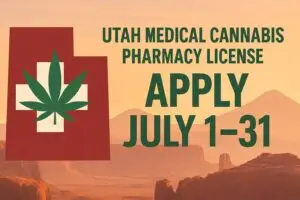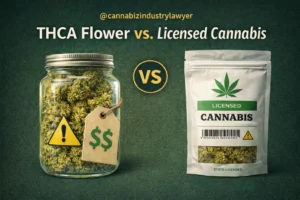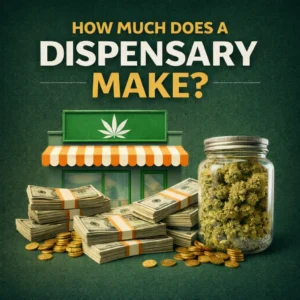Utah will award one new Independent Medical Cannabis Pharmacy license in the 2026 special round created by House Bill 54 (2025 Session). Missing this window could mean waiting years for another opportunity—so every point on the 600-point scorecard matters.
Table of Contents for Utah Independent Medical Cannabis Pharmacy Application
- Overview of the 2026 Special Licensing Round
- Who Can Apply? Eligibility & Location Rules
- Key Dates, Fees & Filing Portal
- Scoring Criteria & How to Maximize Points
- Real-Estate & Zoning Requirements
- Cost & Financial Readiness Checklist
- Step-by-Step Application Roadmap
- Community-Benefit & Local Hiring Plan
- Utah Compliance Checklist
- Common Pitfalls to Avoid
- Post-Award Timeline: Month-by-Month
- Why Hire a Utah Cannabis Licensing Lawyer
- FAQ
Overview of the 2026 Special Licensing Round

Three take-aways define this round:
- Winner-takes-all — Only one pharmacy slot exists statewide.
- No transfers for 15 years — Utah Code § 4-41a-1006(5) bars any sale or change of control until 2041.
- Scored out of 600 points — Company, Operating Plan, and Strategic Plan sections drive success.
Who Can Apply? Eligibility & Location Rules
Utah’s statute and administrative rules require two filters:
- Ownership Exclusion. No owner (10%+ equity or control) may hold any direct or indirect interest in an existing Utah medical cannabis pharmacy.
- Location Restriction. The proposed site must:
- Be in a Medically Underserved Area (MUA) as defined by the federal HRSA MUA Finder.
- Sit inside a county of the third, fourth, fifth, or sixth class. First- and second-class counties (Salt Lake, Utah, Weber, Davis) are off-limits.
Tip → Download UDAF’s “County Classification Map” and cross-reference the HRSA tool before signing any lease.
Key Dates, Fees & Filing Portal
| Milestone | Deadline / Fee |
|---|---|
| Application portal opens | July 1 2025 |
| Application portal closes | July 31 2025 @ 11:59 PM MT |
| Board presentations to finalists | October 9 2025 |
| License issued | By Dec 31 2025 |
| Non-refundable application fee | $2,500 |
| Filing portal | UDAF Grants Portal |
Scoring Criteria & How to Maximize Points
The Board uses a 600-point rubric:
- Company Information — 130 pts
- Operating Plan — 270 pts
- Strategic Plan — 200 pts
Deep-Dive on Sub-Questions
Below are the exact items UDAF evaluators score. Items flagged with an asterisk (*) carry extra weight.
| Sub-Section | Points | Optimization Tips |
|---|---|---|
| Ownership structure | 20 | Provide org chart, cap table, and POF letters. |
| Regulatory track record | 40 | Attach prior inspection reports & compliance certificates. |
| Location & business info | 70 | Show signed LOI, zoning letter, and community support letters. |
| Facility design* | 80 | Include professional elevations, vault specs, HVAC filtration. |
| Staffing & training | 70 | Provide pharmacist-in-charge résumé and LMS screenshots. |
| Sales strategy* | 90 | Detail omni-channel ordering, curbside, and delivery protocols. |
| Security plan* | 30 | List UL-listed alarm, 90-day video retention, biometric access. |
| Strategic Q #46-#53* | 200 | Demonstrate patient access gains, MUA outreach, price parity. |
Scorecard hack: Utah deducts for vagueness. Provide page-level cross-references (<See Operating Plan §3.2, p. 27>) so reviewers find answers instantly.
Real-Estate & Zoning Requirements
Applicants must hold site control on day one—usually via a Letter of Intent (LOI) or signed lease contingent on licensure. The property must be:
- ≥ 200 ft from any community location (school, daycare, church, library, playground, park).
- ≥ 600 ft from any area zoned residential.
Include a floor plan with designated:
- Public access area
- Card-holder access area
- Private consult rooms
- Limited-access vault & receiving
- Exterior architectural elevations
Cost & Financial Readiness Checklist
| Cost Item | Amount | Due |
|---|---|---|
| Application fee | $2,500 (check or card) | With submission |
| Performance bond or liquid cash | $100,000 | Proof in application; funded pre-licensure |
| Build-out & working capital | $650k-$1.2M† | Post-award |
† Estimate assumes 1,500-2,000 sq ft pharmacy build at $225-$300 /sq ft plus 90 days of inventory and payroll.
Step-by-Step Application Roadmap
- Secure qualifying address. Use HRSA tool → confirm county class.
- Form entity & clear ownership. Run proactive background checks; schedule LiveScan fingerprints.
- Draft Operating Plan. SOPs for security, inventory, recall, disposal, QA.
- Model Strategic Plan. Patient projections, pricing strategy, 12-month launch Gantt.
- Assemble financials. Bond commitment letter, pro-forma, three-year cash-flow.
- Compile into ≤ 100-page PDF (single file, UDAF order) and upload to U-DAF portal.
- Prepare 10-minute Board deck. Focus on social impact and readiness.
- Stay inspection-ready. Site & financial verification happens quickly after award.
Community-Benefit & Local Hiring Plan
Because Utah’s mandate targets medically underserved areas, applicants that quantify community impact can gain a decisive edge:
- Rural clinic partnerships. Offer pharmacist consultations via tele-medicine once per week.
- Sliding-scale pricing. Publish a discount schedule for low-income card-holders; include data on price per mg vs. metro averages.
- Local workforce pledge. Commit to hiring 75% of staff from within the county and outline apprenticeship pathways for pharmacy technicians.
- Patient-education scholarship fund. Set aside $10,000 annually for free initial card evaluations through state-registered QMPs.
Utah Compliance Checklist
Copy-paste this box into your internal QC tracker:
- Statutory citations. Utah Code Title 4, Ch. 41a (le.utah.gov/xcode/Title4/Chapter41a)
- Administrative Rules. R66-5-1 → R66-5-10 (rules.utah.gov)
- ADA facility standards. ICC A117.1-2017 & Utah Admin Code R156-56-704.
- Video retention. 90 days @ 720p minimum with remote access for UDAF inspectors.
- Seed-to-sale integration. Upload test order & sales data to UDHHS EVS within 24 hrs.
- Advertising rules. No health claims; signage limited to 10 sq ft; no imagery visible from roadway.
Common Pitfalls to Avoid:
Even rock-solid teams stumble on these issues:
-
- Wrong county or MUA status -Verify HRSA designation
and
- county class before paying for due diligence.Missing bond documentation – Attach surety acknowledgement letter—even if funds will be posted post-award.> 100-page PDF – Utah rejects oversized files outright.Late fingerprints – Owners must submit LiveScan before July 31 2025; schedule slots early in rural areas.
Post-Award Timeline: Month-by-Month
Month 0 (Oct 2025) — License granted → execute full lease & fund $100k bond.
Month 1-3 — Finalize design drawings, pull building permits, order vault & security hardware.
Month 4-6 — Begin construction; hire PIC; submit operational SOPs to UDAF for conditional approval.
Month 7-9 — Install pharmacy automation, CCTV, and intrusion detection; initiate workforce onboarding; launch patient-education campaign.
Month 10-11 — State pre-opening inspection & systems validation. Stock inventory after compliance sign-off.
Month 12 — Grand opening to patients (statutory deadline: 12 months from award).
Why Hire a Utah Cannabis Licensing Lawyer or Consultant
With a single license at stake and Utah’s detailed 600-point rubric, DIY efforts often leave critical points on the table. A specialist attorney can:
- Stress-test your narrative for rubric alignment
- Draft SOPs that match R66-5 verbatim language
- Coordinate architects, security integrators, bankers, and HRSA compliance teams
- Represent you at the October 2025 Board presentation
Schedule a strategy call today »
FAQ
How many Independent Pharmacy licenses are available in 2026?
Only one license will be awarded statewide in this special round.
What is the application fee and how do I pay it?
The non-refundable fee is $2,500, payable by check to UDAF or by credit card at (801) 982-2200.
Can I transfer or sell the license later?
No. Utah Code § 4-41a-1006(5) prohibits any transfer of control of the Independent Medical Cannabis Pharmacy license for 15 years after issuance.
Do I need the $100 k bond before applying?
You must provide written acknowledgement of a $100,000 performance bond (or cash account) in your application and secure it before UDAF issues the license.
Where can I find official rules and forms?
Visit the Utah Medical Cannabis Program at https://medicalcannabis.utah.gov for statutes, administrative rules, and downloadable forms.
Official resources:
Utah Medical Cannabis Program |
R66-5 Administrative Rules |
Utah Code 4-41a




